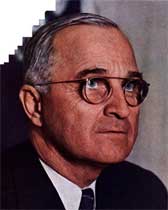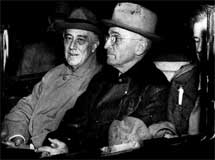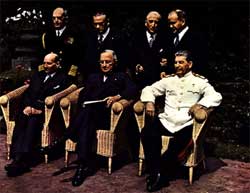|  Harry S. Truman was the thirty-third President of the United States. Truman authorized the use of the atomic bomb against Japan in 1945. He became President when Franklin Roosevelt became the seventh Chief Executive to die in office. In World War I he was an officer in a unit known for the battles of Saint-Mihiel and Argonne. After the war he married Elizabeth Wallace, known as Bess, but whom Harry called "Mother." He became a partner in a clothing store that went bankrupt during the Depression. Harry Truman was much respected for his straight talk and his ability to make hard decisions, often heard saying, "If you can't stand the heat, get out of the kitchen." He had a sign on his desk that read "The Buck Stops Here." Harry S. Truman was the thirty-third President of the United States. Truman authorized the use of the atomic bomb against Japan in 1945. He became President when Franklin Roosevelt became the seventh Chief Executive to die in office. In World War I he was an officer in a unit known for the battles of Saint-Mihiel and Argonne. After the war he married Elizabeth Wallace, known as Bess, but whom Harry called "Mother." He became a partner in a clothing store that went bankrupt during the Depression. Harry Truman was much respected for his straight talk and his ability to make hard decisions, often heard saying, "If you can't stand the heat, get out of the kitchen." He had a sign on his desk that read "The Buck Stops Here."
His policy of containment of Soviet expansionism initiated the long Cold War with the Soviet Union. He had trouble with Congress and labor groups over the conversion of the economy back to peacetime conditions after WWII. While he was staying at the Blair House because the White House was undergoing renovations, two Puerto Rican nationalists tried to assassinate Truman. His reply to the assassination attempt was "A President has to expect those things." In 1965 he was given the Freedom Award.

Born on May 8, 1884, in Lamar, Missouri, Harry Truman grew up on a farm. After being active in local Democratic politics for a decade, Truman was elected to the United States Senate in 1934. Prior to that, his first political position was as a judge in Jackson County in 1922, where he earned a reputation for firing inept workers and attempting to end corruption. As a United States Senator, he supported New Deal legislation and served on the Appropriations Committee and the Interstate Commerce Committee. Truman exposed fraud and waste in defense programs and revealed the appalling conditions in army camps and defense plants.

 Franklin Roosevelt chose Truman to be his running mate in the Presidential election in 1944, and when Roosevelt died eighty-two days after starting his fourth term, Truman took over as President. Franklin Roosevelt chose Truman to be his running mate in the Presidential election in 1944, and when Roosevelt died eighty-two days after starting his fourth term, Truman took over as President.
Truman believed that Stalin wanted to spread the Communist influence throughout Europe. The Truman Doctrine, which became law in 1947, was aimed at protecting Greece and Turkey from Communist domination. Later, it also blocked Communist expansion anywhere in the world. Truman implemented the Marshall Plan to aid in the economic recovery of western Europe after World War II. In addition to providing financial aid to help war-torn Europe rebuild, The Marshall Plan made the United States a world power. He also initiated the establishment of the North American Treaty organization (NATO
NATO was formed to help prevent the spread of Communism. It was the first peacetime military alliance the United States had ever joined. The Soviet Union's ability to use and develop atomic weapons had put the United States in a nuclear arms race, which led to the development of the hydrogen bomb. When the Soviet Union sent Communist forces to China and Korea, Truman expanded the Truman Doctrine to include Asia. He sent American troops to support the United Nations in the Korean War, which was technically a "police action." In a controversial move, Truman removed General Douglas MacArthur from his command in Korea. Truman was also providing financial aid to the French in Vietnam.
 It was during the Truman presidency that the National Security Council and the Central Intelligence Agency were established. These organizations bypassed the State Department and Congress to provide advice and information directly to the President. The Bureau of the Budget also started doing things that congressional committees had previously done. These changes increased the power of the presidency by giving the Chief Executive more ability to function outside of congressional restraints. Fear of Communism gripped the United States and the House Committee on Un-American Activities suggested that Communists had infiltrated the Truman administration. To combat these attacks, Truman decided that all federal employees had to be screened by loyalty boards. It was during the Truman presidency that the National Security Council and the Central Intelligence Agency were established. These organizations bypassed the State Department and Congress to provide advice and information directly to the President. The Bureau of the Budget also started doing things that congressional committees had previously done. These changes increased the power of the presidency by giving the Chief Executive more ability to function outside of congressional restraints. Fear of Communism gripped the United States and the House Committee on Un-American Activities suggested that Communists had infiltrated the Truman administration. To combat these attacks, Truman decided that all federal employees had to be screened by loyalty boards.
His domestic policy, called the "Fair Deal", was basically a continuation of Roosevelt's "New Deal," and was frustrated by the resurgence of the Republicans who won control of Congress in 1946. When Congress fought against his domestic policies Truman used the power of the veto. He unsuccessfully tried to stop the Taft-Hartley Act, which weakened some of the powers acquired by organized labor during the New Deal.
In 1948 Truman won a stunning and unexpected victory over Thomas Dewey. As hard as he tried, Truman was unable to obtain civil rights legislation, get federal aid for education, repeal the Taft-Hartley Act, set up a public power project, or set up a national health insurance system. However, he was able to implement some of the New Deal policies, such as providing subsidies to farmers and public housing; establishing social security, and a minimum wage. His homespun, often feisty style of leadership made him a symbol of no-nonsense Middle America. Although not without support, Harry Truman decided not to run for reelection in 1952. He retired to Independence, Missouri where he remained active in politics until his death in Kansas City, Missouri on December 26, 1972.
|

